For Kerry James Marshall, the mission is clear: Bring portraits of black life into very white art museums
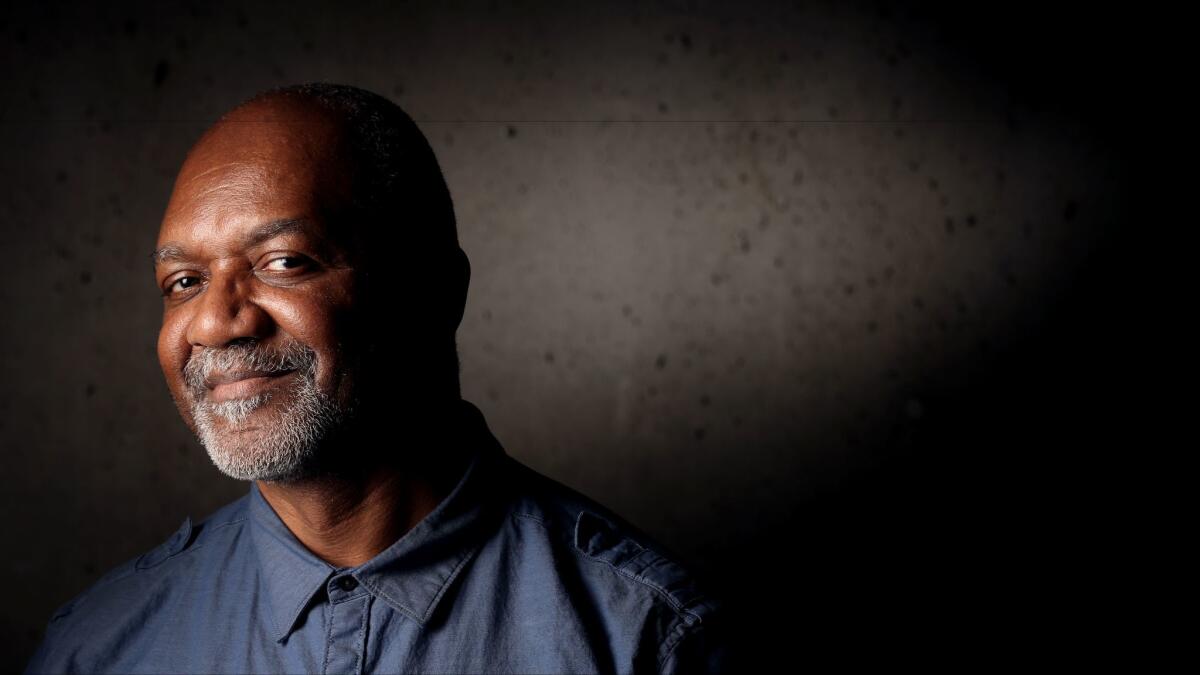
- Share via
For much of his adult life, the artist Kerry James Marshall has been on a mission to redress a big omission: “When you go to an art museum,” Marshall says, “the thing you’re least likely to encounter is a picture of a black person. When it comes to ideas about art and about beauty, the black figure is absent.”
Marshall has spent 35 years working to rectify that absence, creating powerful paintings of black figures in everyday life and, often, in settings referencing earlier work by artists from the Renaissance to Edward Hopper and Frank Stella. Marshall, 61, has been rewarded for that effort with residencies, fellowships and other accolades, including a MacArthur grant in 1997 and the acquisition of his work by the likes of the
The Chicago-based artist’s first major U.S. retrospective, “Kerry James Marshall: Mastry,” opens Sunday at the Museum of Contemporary Art in L.A., one of three co-organizers of the show. The exhibition ran last year at the
“I’ve been acutely aware that museums are behind their academic colleagues in terms of thinking of representation and people of color,”
SIGN UP for the free Essential Arts & Culture newsletter »
Marshall is a compelling storyteller, whether on canvas or in conversation. Talking at length during a visit to MOCA, he is easygoing but eloquent, recalling his neighborhood in Birmingham, Ala., where he was born in 1955, or about growing up black there and in Los Angeles. He remembers the names of teachers who encouraged him — as far back as his kindergarten teacher, Mary Hill.
Hill kept a scrapbook full of greeting cards, pictures from National Geographic and other images that she would show her students as a reward for good behavior. “Her class was my first encounter with imagery that let me know I wanted to be an artist,” Marshall says. “It sounds extraordinary, but the truth is nothing had as much impact on me as looking through that scrapbook. It was clear those cards were made by hand, and if somebody else could do it, you could do it too.”
His world view also was shaped early on. In 1963, a pivotal time in civil rights history, Marshall’s family moved from Birmingham to the Watts area of Los Angeles. Their first home here was in the then-new Nickerson Gardens housing project, subject of one of his most poignant large-scale paintings. When the Watts riots came in 1965, he watched from a nearby friend’s attic window as flames consumed stores, and he describes the scene in as much detail as if it happened last week. .
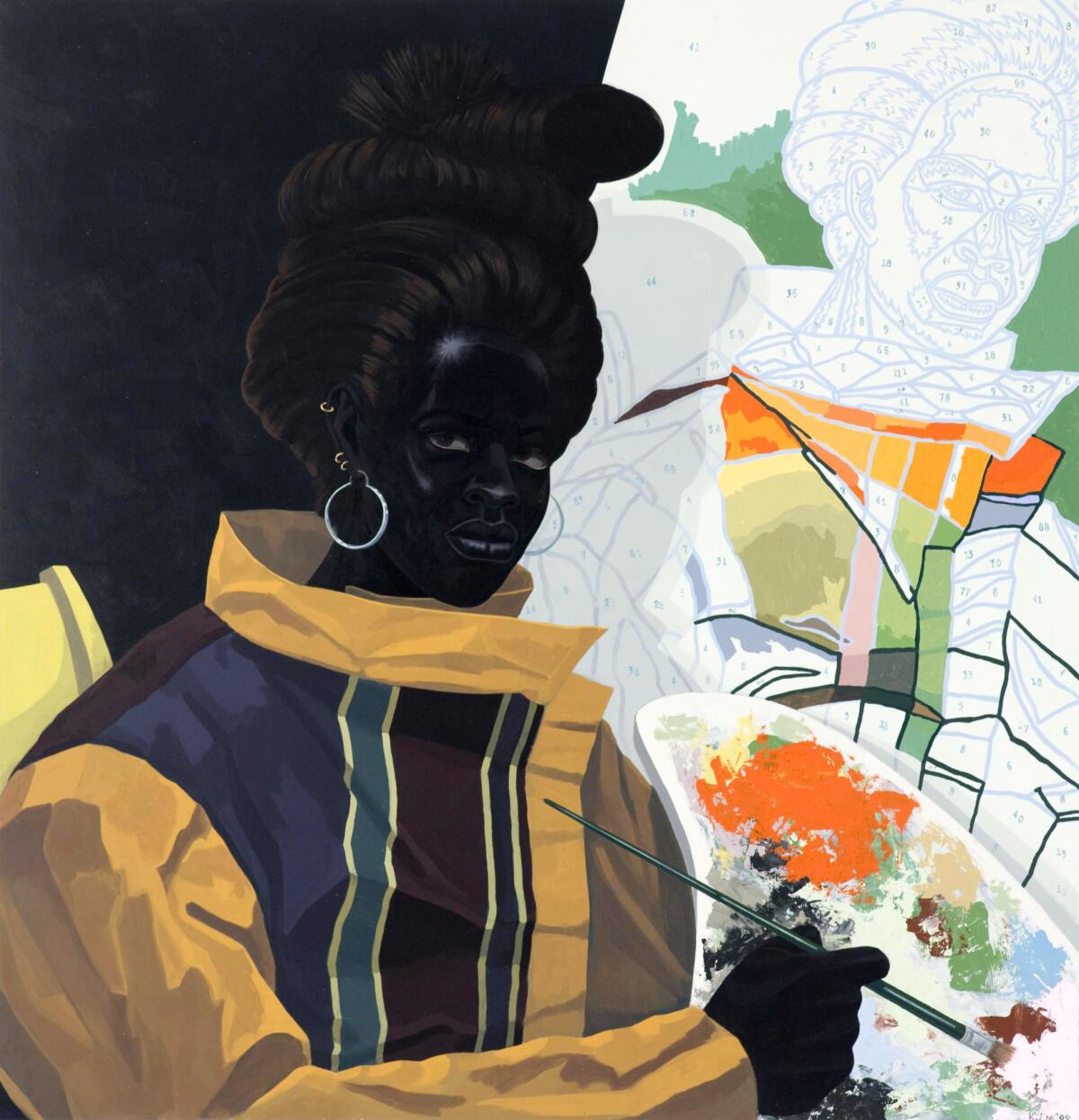
Marshall paints a verbal portrait of himself as an insatiable learner as a child, studying images wherever he found them. He learned to paint flowers in the third grade and first went to a library in the fourth grade. There, he says, “I looked at every single book on the shelf about art: every how-to book, every art history book, every monograph about an artist.”
In the sixth grade, he went on a field trip to LACMA, “which is how I learned there is such a place as an art museum,” Marshall says. “It was the first time I saw an original artwork.”
Still in middle school, he was selected for a special drawing class at what is now the Otis College of Art and Design. Among his heroes was the black social realist painter Charles White, and one day his Otis teacher showed slides from White’s 1967 book, “Images of Dignity,” then took the students upstairs to look at White’s on-campus studio.
“That was for me a life-altering experience,” Marshall says. “I saw for the first time what an artist’s studio was. You could see work just starting and work that was almost completed. I clearly understood that making artwork wasn’t magic. It doesn’t just happen. You have to work at it.”
White came by his class that day and was soon mentoring Marshall, whose first job after high school graduation was washing dishes in a local hospital kitchen. The first person in his family to go to college, he worked there and elsewhere until he made it to Los Angeles City College and got the units he needed to study at Otis, where he graduated in 1978. He was on his way.
Asked when he first began to notice a lack of black subjects in museum artworks, Marshall answers a different question.
“You have to take an overview of how the culture is structured,” he says. “Even before I got to museums, I was interested in comic books. When you grow up looking at Superman, Batman and all those superheroes, you take it for granted that is what superheroes are supposed to be. So then, when I see art books at the library, and I’m seeing Leonardo da Vinci and Michelangelo and Rembrandt, I think that’s what artists look like.
“At a certain point, you have to decide whether you’d be satisfied always acknowledging the beauty and the greatness of what other people create or if you want to be in the same arena. You can’t keep saying that a superhero is a white guy with a square jaw and broad shoulders because every time you say that, it means you can’t be a superhero. You have to demonstrate that you believe you have the capacity to be a superhero too. Or the capacity to be an ‘old master.’”
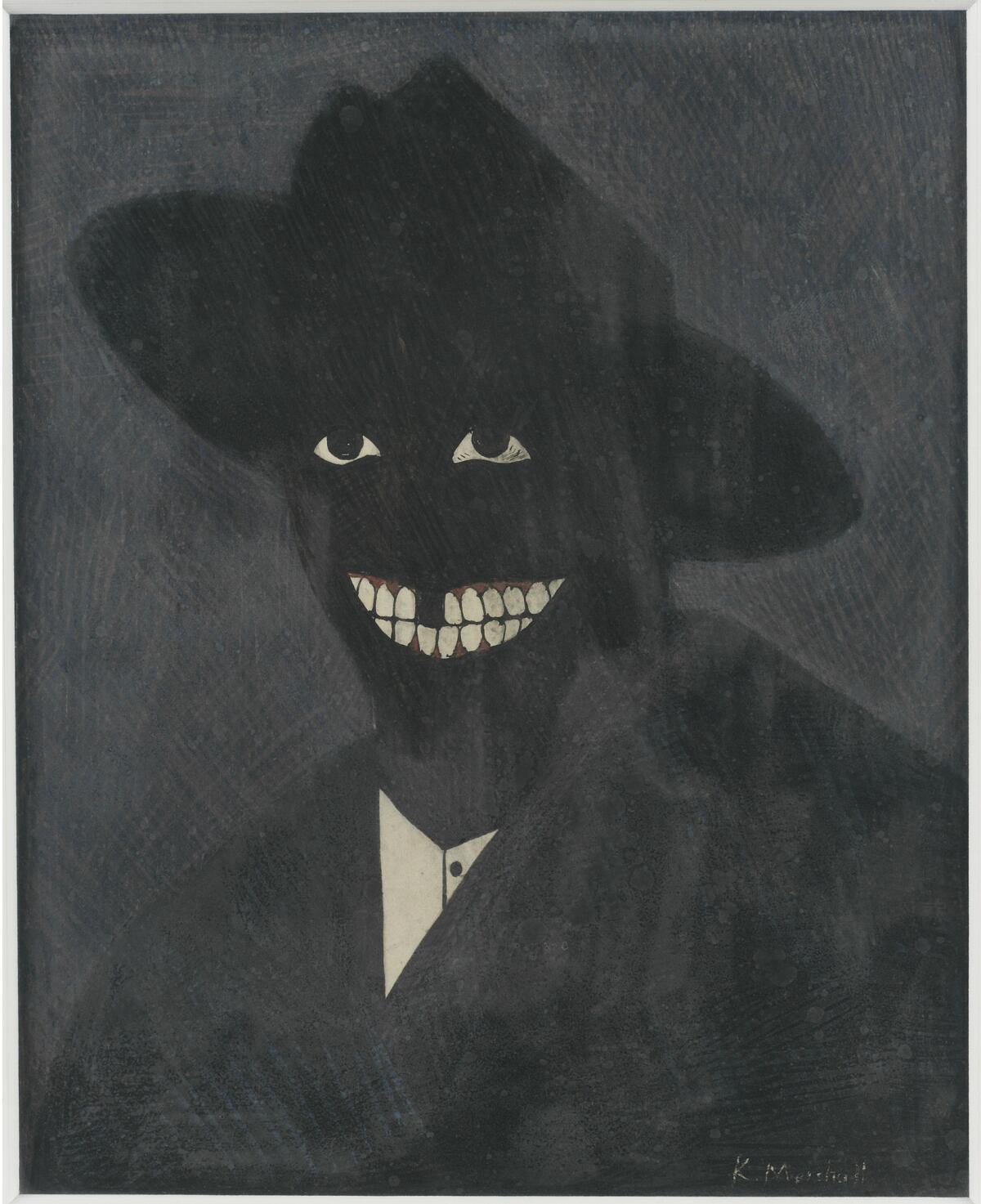
Still in his 20s and inspired by Ralph Ellison’s 1952 novel, “Invisible Man,” Marshall painted in 1980 “A Portrait of the Artist as a Shadow of His Former Self.” It is a picture of a smiling black man whose black face, hat and coat nearly disappear into the background, the blackness offset by only the whites of his eyes, teeth and collar. Says Marshall: “When I did that painting was the moment in which I reset my priorities.”
Now comes “Mastry.” Museum of Contemporary Art Chicago Director
Although there are excerpts from Marshall’s ongoing graphic novel/comics project, “Rythm Mastr,” as well as some photographs, the 80 works in the MOCA show are mostly paintings of black figures, many in landscapes and seascapes, neighborhood outings, Boy Scout troops, artist studios and romantic idylls. The slave Nat Turner and abolitionist Harriet Tubman, Martin Luther King Jr. and President John F. Kennedy also make appearances.
“The paintings, particularly the larger ones, also revel in details that make the story more narratively complex,” Molesworth says. “In a Kerry James Marshall painting, nothing is arbitrary. Everything has been thought through. He is building a picture from the ground up.”
There are plenty of details in “De Style,” Marshall’s 1993 mural-size painting of a black barbershop, a high point of the exhibition. The painting, acquired by LACMA shortly after it was shown in a gallery, marked Marshall’s first museum sale.
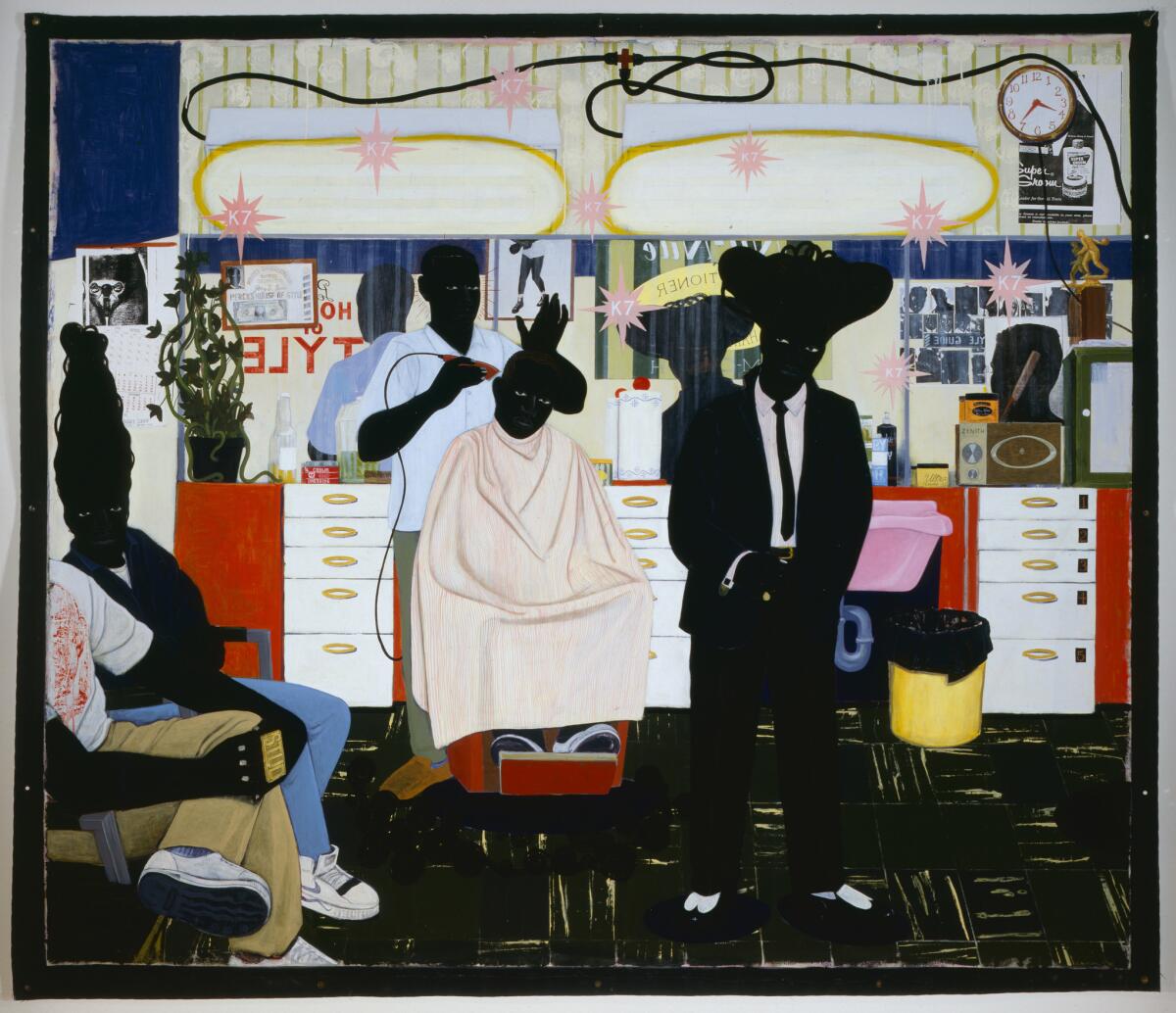
“‘De Style’ combines a deeply stirring realistic setting in conversation with art history,” says Stephanie Barron, senior curator of modern art at LACMA, which has loaned the piece for the exhibition. “It’s kind of a Norman Rockwell scene which is loaded with art references, including Dutch 17th century paintings, the De Stijl movement and Piet Mondrian with his rectilinear compositions and reliance on only primary colors.”
In the bigger picture, Barron says, Marshall is regarded as one of the key artists to emerge in the 1990s. “He is a master of representational and figurative painting, refined during the time when neither was popular,” she says, “and he has created a body of work that recognizes beauty and gives dignity to all of his subjects.”
As a longtime professor at the University of Illinois, Chicago, Marshall has had considerable influence on future generations of artists.
“I’m working with artists today who were greatly influenced by Kerry,” reports his longtime dealer, Eleana Del Rio at Koplin Del Rio gallery in Seattle. “He paved the way for a lot of younger artists who are not only talking about black identity but all identity.”
♦ ♦ ♦ ♦ ♦ ♦ ♦ ♦ ♦ ♦
‘Kerry James Marshall: Mastry’
Where: Museum of Contemporary Art, 250 S. Grand Ave., L.A.
When: Sunday-July 3
Admission: $8-$15
Information: (213) 626-6222, moca.org
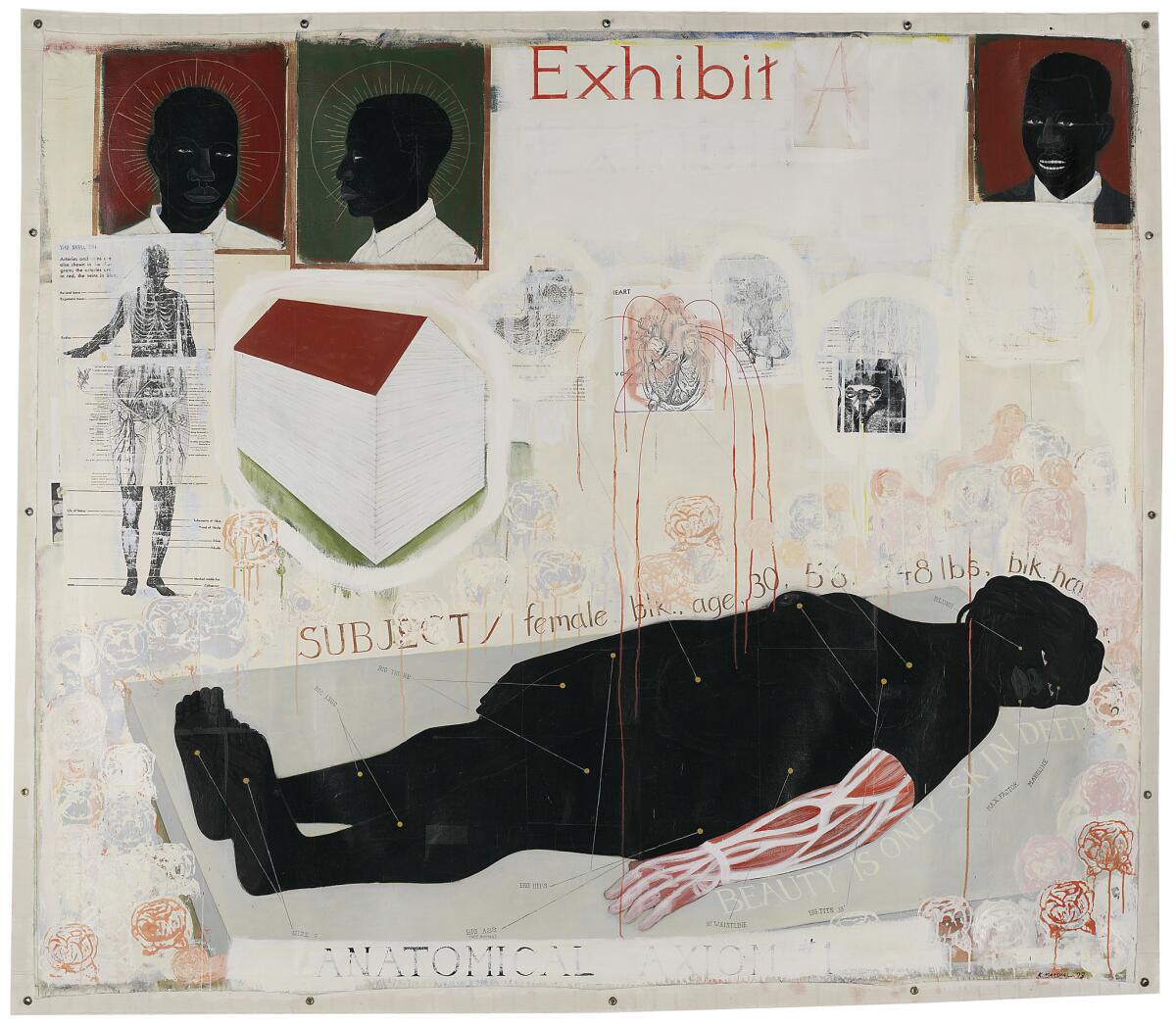
Follow The Times’ arts team @culturemonster.
ALSO
L.A. in the 1970s: A visual and architectural treasure trove at LAXART
Former Santa Monica Museum of Art will open in September with Martín Ramírez
Getty acquires trove of work by 17 influential photographers
MOCA gift consists of 22 key works exploring gender and queer identity
'Made in L.A. 2018': Curators announced for Hammer biennial
The art of Moholy-Nagy at LACMA
Jimmie Durham's art throws some well-aimed stones
The biggest entertainment stories
Get our big stories about Hollywood, film, television, music, arts, culture and more right in your inbox as soon as they publish.
You may occasionally receive promotional content from the Los Angeles Times.







